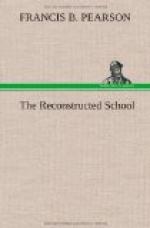The test of a real teacher is not whether she will be good to the children but, rather, whether she will be good for the children, and these concepts are wide apart. If our colleges and normal schools could but gain the notion that their function is to prepare teachers who will be good for children they might find occasion to modify their courses radically. Unless she has serenity the teacher is not good for children, for serenity is one of the qualities which they themselves should possess as the result of their school experience and it is not easy for them to achieve this quality if the teacher’s example and influence are adverse. We test prospective teachers for their knowledge of this subject and that, when, in reality, we should be trying to determine whether they will be good for the pupils. But we have contracted the habit of thinking that knowledge is power and so test for knowledge, thinking, futilely, that we are testing for power. We judge of a teacher’s efficacy by some marks that examiners inscribe upon a bit of paper, “a thing laughable to gods and men.” She may be proficient in languages, sciences, and arts and still not be good for the children by reason of the absence of spiritual qualities. None the less, we admit her to the school as teacher when we would decline to admit her to the hospital as nurse. We say she would not be good for the patients in the hospital but nevertheless accept her as the teacher of our children.
In Ephesians we read, “But the fruit of the Spirit is love, joy, peace, longsuffering, gentleness, goodness, faith, meekness, temperance,” and such an array of excellent spiritual qualities should attract the attention of all the agencies that have to do with the preparation of teachers. We need only to make a list of the opposites of these qualities to be convinced that the teacher who possesses these opposites would not be good for the children. Now serenity embodies all the foregoing excellent qualities and, therefore, the teacher who has serenity has a host of qualities that will make for the success and well-being of her pupils. Again, quoting from Henderson: “My whole point is that these spiritual qualities in a boy are infinitely more important to his present charm and future achievement than any amount of academic training, than the most complete knowledge of reading, writing, arithmetic, history, geography, grammar, spelling, classics, and natural science. For charm and achievement are of the Spirit. It is very clear, then, that we ought to make these spiritual qualities the major end of all our endeavor during those wonderful years of grace; and that we ought to allow the intellectual development, up to fourteen years at least, to be a by-product, valuable and welcome certainly, but not primarily sought after. In the end we should get much the larger harvest of intellectual power, and much the larger man.”




